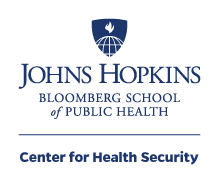India-US Biosecurity Dialogue
20-21 September, 2016
The UPMC Center for Health Security hosted the first meeting of a bilateral biosecurity dialogue between delegates representing the United States and India. This effort was supported by the Project on Advanced Systems and Concepts for Countering WMD (formerly of the Naval Postgraduate School; currently affiliated with the US Air Force Institute for National Security Studies), and sponsored by the Defense Threat Reduction Agency. The meeting took place in Washington, DC and included discussions on the biosecurity landscapes of the US and India, development of medical countermeasures, the life sciences and biotechnology, biosafety-strengthening efforts at laboratories, risk assessment, and cross-sector collaboration for mitigating biological threats
Agenda
20 September 2016
8:30 – 9:00 Light Breakfast, Coffee/Tea, Plaza A
9:00 – 9:30 Welcome, Goals for Meeting, and Introductions, Plaza B
Dr. Tom Inglesby, Director, UPMC Center for Health Security
9:30 – 10:45 Dialogue Session One: Priorities, Strengths & Challenges in National Biosecurity
During this opening session, we will discuss what each country views as its leading concerns, greatest strengths, and most important challenges relating to biosecurity. In your view, what biological threats are of greatest concern to each country? How have each country’s distinct histories shaped these priorities? Are there distinctions between how each country considers natural vs. deliberate biological threats? Is there a difference between how each country approaches and manages well known and more common infectious diseases (e.g. HIV, TB, hepatitis) vs acute novel events (e.g. SARS, novel flu strains, Ebola, Zika)? With respect to emerging biological threats, what has caused great concern or surprise in recent years? One representative from each country will provide opening remarks (5-10 minutes) on this topic, followed by a discussion by all participants.
Opening Remarks: Dr. Indira Nath & Dr. David Franz
10:45 - 11:00 Coffee Break, Plaza B Foyer
11:00 – 12:15 Dialogue Session Two: Medical Countermeasures, Emerging Biotechnology and Risk Assessment
Emerging biotechnologies are widely recognized as being highly beneficial for medicine, health, agriculture, and for national economies. These powerful developments are accompanied by the potential for both better medical countermeasures as well as increased risks for the potential for deliberate misuse of biotechnology. How do the US and India see the future of biotechnology changing the ability to develop medical countermeasures for biological threats? What are the national concerns related to new risks that could emerge from biotechnology? What is your government’s process for risk assessment(s) to evaluate and compare these risks? How is your country’s risk assessment process linked to a process for managing and addressing biological risks? Are there areas of potential collaboration between the US and India on any of these issues? A representative from each country will provide opening remarks (5-10 minutes) on this topic, followed by a discussion by all participants.
Opening Remarks: Mr. S.R. Rao, Dr. Peggy Hamburg
12:15 – 1:15 Lunch, Plaza A
1:15 – 2:15 Dialogue Session Three: Strengthening the Response Nationally and Internationally to Natural Threats
This discussion will explore national approaches for early detection and surveillance in response to new outbreaks, as well as opportunities to improve international collaboration on these issues. What are the most important systems in place for early detection of new outbreaks? What has been learned in the response to SARS, MERS, novel flu, Ebola, and/or Zika? What disease containment lessons emerge from these outbreaks? What are priority areas in terms of building national response capacity, and building the technical capacity to mount an effective response? What is the perception of progress made and future action needed to adhere to the International Health Regulations and the Global Health Security Agenda? A representative from each country will provide opening remarks (5-10 minutes) on this topic, followed by a discussion by all participants.
Opening Remarks: Dr. Rakesh Bhatnagar & Dr. Tom Inglesby
2:15 – 3:00 Reflections on US Biodefense Strategy, followed by Q&A
Presentation by Rear Admiral Kenneth Bernard (USPHS, Ret.), Member, Threat Reduction Advisory Committee (DoD), former Special Assistant to the President for Security and Health on the National Security Council (NSC) Staff at the White House
3:00 – 3:30 Travel by shuttle bus to the White House in Washington, DC
4:00 – 5:15 Meeting with Dr. Beth Cameron, Senior Director for Global Health Security and Biodefense, National Security Council
5:15 Walk to dinner
6:00 Biosecurity Dialogue Dinner at iCi Restaurant
Sofitel, 806 15th Street NW, Washington, DC 20005
8:00 Travel by shuttle bus to the Ritz-Carlton, Arlington, VA
21 September, 2016
8:30 – 9:00 Light Breakfast, Coffee/Tea, Plaza A
9:00 – 10:15 Dialogue Session Four: Biosecurity & Biosafety, Plaza B
This session will focus on biosecurity and biosafety in India and the US. What are the most pressing biosafety issues in India and in the US, and how does each view biosafety problems on the horizon? To what extent does your country track (via national registry or other means) labs that work on high consequence pathogens/select agents? How do research scientists in your countries regard current biosafety rules and guidelines? Are the guidelines sufficient? Have they discouraged research on high consequence pathogens? How much regulatory oversight is provided – do you think it is too much or too little? Do you employ “personnel reliability” programs in labs that work on high consequence pathogens? How effective do people think these programs are? How do you ensure a laboratorian is "reliable" and not going to do something dangerous with a pathogen? A representative from each country will provide opening remarks (5-10minutes) on this topic, followed by a discussion by all participants.
Opening Remarks: Dr. Jaishree Garhyan & Dr. Maureen O’Leary
10:15 – 10:45 Briefing about the 2016 Biological Weapons Convention Review Conference
Meg L. Flanagan, PhD, US Department of State
10:45 – 11:15 Coffee Break, Plaza B Foyer
11:15 - 12:30 Discussion Session Five: Countering Biology as a Deliberate Threat
In this discussion, there will be a focus on each country’s approach to preparing for and responding to deliberate biological threats. What are the important elements of your country’s plans to prepare for or respond to adversary use of biological weapons? How does the review conference of the Biological Weapons Convention factor into these preparations to counter deliberate threats? How would responsibilities be divided among Defense, Health and Disaster/ Emergency Management following biological weapons use? In the event of suspected use of biological weapons, what are the national response mechanisms? Do greatest concerns emanate from other countries, terrorist groups, or lone individuals? Could biological weapons events occur that aren’t able to be attributed? A representative from each country will provide opening remarks (5-10minutes) on this topic, followed by a discussion by all participants.
Opening Remarks: Dr. Pawan Dhar & Dr. Parney Albright
12:30 – 1:45 Group Photo, followed by Lunch in Plaza A
1:45 – 2:15 Remarks by Dr. Ronald Hann, Jr., Director, Chemical and Biological Technologies Dept. at Defense Threat Reduction Agency
2:15 – 3:30 Discussion Session Six: Regional Contingencies, Potential areas of partnership
In this session, we will explore the potential for regional biological threats, and examine areas where India and the US may be able to work together to resolve regional contingencies with biosecurity implications. The discussion will include what natural, deliberate or accidental biological threats may benefit from collaboration or joint response. This discussion will also consider the role of collaborative relationships between scientists, public health practitioners, and the security community. Is there an opportunity for governmental agreements which could aid security and scientific collaboration between the two countries? A representative from each country will provide opening remarks (5-10 minutes) on this topic, followed by a discussion by all participants.
Opening Remarks: Dr. Indira Nath & Amb. Ronald Lehman
3:30 – 4:00 Proposals for Future Biosecurity Dialogue Topics
Group discussion about topics for next biosecurity dialogue meeting in 2017.
4:00 Meeting Adjourns
Meeting Participants
Penrose (Parney) C. ALBRIGHT, PhD
President and CEO
HRL Laboratories, LLC
Rakesh BHATNAGAR, PhD
Professor
J. C. Bose National Fellow
School of Biotechnology
Jawaharial Nehru University
Anita CICERO, JD
Chief Operating Officer and Deputy Director
UPMC Center for Health Security
Margaret A. HAMBURG, MD
Foreign Secretary
Academy of Medicine
William P. HOSTYN, MS
Director, Advisory Committees and Programs Office
Defense Threat Reduction Agency
Tom INGLESBY, MD
Chief Executive Officer and Director
UPMC Center for Health Security
Ambassador Ronald F. LEHMAN, II
Counselor to the Director
Lawrence Livermore National Laboratory
Indira NATH, MD
Former, Head and Sr. Professor
Department of Biotechnology, AIIMS Delhi
Former, Raja Ramanna Fellow and Emeritus Professor, NIOP, Delhi
Maureen O’LEARY, PhD, MBA
Director, Environmental Health & Safety
Dartmouth College
Pawan K. DHAR, PhD
Professor and Head, Synthetic Biology
School of Biotechnology
Jawaharial Nehru University
David R. FRANZ, DVM, PhD
Jaishree GARHYAN, PhD
Jawaharial Nehru University
New Delhi, India
The Forsyth Institute, Cambridge, USA
Gigi GRONVALL, PhD
Senior Associate
UPMC Center for Health Security
S. R. RAO, PhD
Advisor
Department of Biotechnology
Ministry of Science and Technology
Government of India
Sanjana RAVI, MPH
Senior Analyst
UPMC Center for Health Security
Observers:
Dave HALL
International Project Manager
Cooperative Biological Engagement Program
Cooperative Threat Reduction Program
Defense Threat Reduction Agency (DTRA)
Shaun HAYESLIP, MPP
Deputy Team Chief, South Asia
US Department of State
Washington, DC
Heema SHARMA, MS
Technical Intramural Research Training Fellow
NIH 8200 Research Plaza
Meeting Report
Executive Summary
20-21 September, 2016
India is an important strategic partner to the United States in health, defense, commerce, and global security. Both nations have established bilateral agreements in science and technology, and share common goals in diminishing epidemic disease and supporting the Global Health Security Agenda. Both are also global leaders in biotechnology, engage in joint military exercises, and play key roles in nonproliferation activities around biological and chemical weapons. Furthermore, as the world’s most populous democracies, the US and India are uniquely poised to benefit from strengthening bilateral ties and increasing collaborative efforts around shared national security priorities, which include a constantly evolving biological threat landscape. In fact, following a June 2016 meeting, President Barack Obama and Prime Minister Narendra Modi affirmed that “the United States and India will work together to combat the threat of terrorists accessing and using chemical, biological, nuclear and radiological materials.”1
For these reasons, in September 2016, the UPMC Center for Health Security hosted a Track II dialogue between India and the US that focused on biosecurity. The meeting took place in Washington, DC, and was sponsored by the Project on Advanced Systems and Concepts for Countering WMD (PASCC; sponsored by the Defense Threat Reduction Agency) of the United States Naval Postgraduate School (the program has since been moved to the US Air Force Institute for National Security Studies).
The purpose of this meeting was to explore biosecurity perspectives of India and the US, examine policy frameworks for mitigating biological threats, share lessons learned and best practices for enhancing biosecurity, and foster partnership and engagement between the two nations. The meeting was attended by participants representing academia, government, and industry in the US and India.
Dialogue participants included experts in biosecurity, biosafety, biodefense, the life sciences, regulatory policy, global health security, and regional security.





